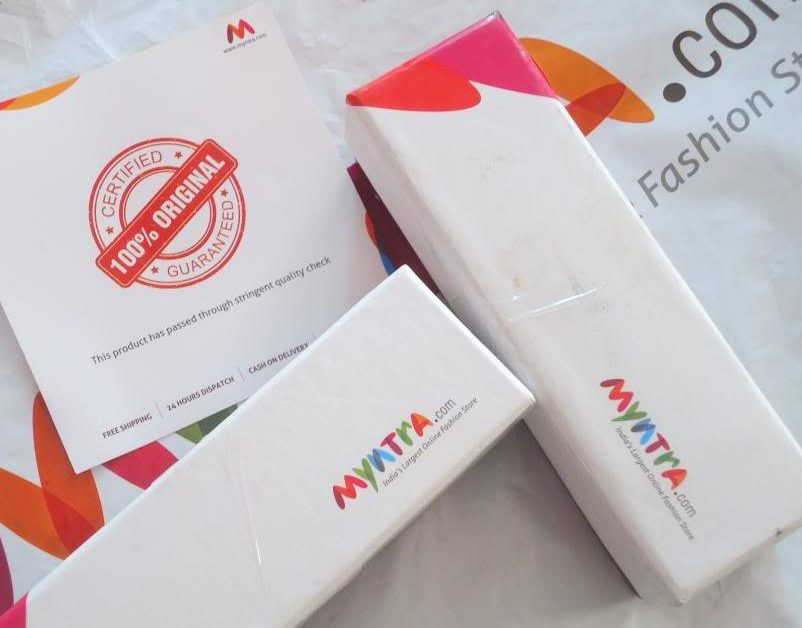 Myntra, the leading e-commerce player specialising in beauty, fashion and cosmetics product sales, is looking at venturing into offline retail model to expand its business in India
Myntra, the leading e-commerce player specialising in beauty, fashion and cosmetics product sales, is looking at venturing into offline retail model to expand its business in India
The online fashion, products portal from India, Myntra.com is planning to open offline retail showrooms dedicated to cosmetics products sales. Branded as ‘Myntra Beauty’ these showrooms will be large speciality stores housed inside prime properties such as malls in India’s top metropolitan cities.
Reportedly, Myntra will model its new cosmetics-focused retail outlets on the lines of Louis Vuitton Moet Hennessy (LVMH) owned Sephora multi-brand stores. Nearly a quarter ago, the French premium beauty and cosmetics retail brand, Sephora revealed its expansion plans of opening 12 retail stores in India partnership with Arvind Ltd.
Myntra sells nearly 250 brands in the beauty creams, make-up, skin care, bath and body, perfumes and beauty appliances categories. Some of its competitors in India’s online space are FeelUnique, GloBox, JoyByNature, NaturalMantra, NewU, Nykaa, Purplle, ShopMissa, and TheSkinStore. With this move, Myntra will be competing with the likes of Bobbi Brown, Body Shop, Colorbar, L’Oreal, Nykaa, and Sephora.
According to a research report published by RedSeer Consulting, India’s cosmetics industry that comprises skin care, hair care, oral care, fragrances, and colour cosmetics segments stood at $6.5 billion in 2017 and is predicted to reach $20 billion by 2025. In an interview to Economic Times, Ananth Narayanan, chief executive at Flipkart-owned Myntra-Jabong, informed that beauty and personal care were the fast-growing segments for Myntra, posting a massive 400 per cent growth year on year.
A high M&A appetite
A series of events have been happening at Myntra of late. Early this month, the company acquired Pretr, an omnichannel retail platform. In July this year, Myntra.com and Jabong.com jointly committed to invest ₹20,600 crore toward expansion of their fashion products and accessories business. In April this year, the company acquired a wearable devices technology startup Witworks for an undisclosed amount. In July 2016, it had acquired Jabong shelling out $70 million for the acquisition. As an e-commerce player, Myntra itself was bought out by the e-commerce giant Flipkart for an estimated value of Rs 2,000 crore in mid-2014.
E-commerce: Shifting gears?
In the recent past, many e-commerce-only players from India have ventured into a new territory. Going beyond their original scripts, these companies opened their offline retail stores to complement their online businesses. While the modalities and approaches taken by these players vary, the offline forays are clearly aimed at providing a brick and mortar foundation to the online experiences their brands deliver to consumers.
The specialist online tea seller, Teabox explored the shop-in-shop concept by tying up with Bengaluru’s Cinnamon—a premium outlet for designer products. Similarly, a few months ago, the online cosmetics seller Nykaa too ventured into the offline retail segment by opening its first beauty and cosmetic products store in Bengaluru.
Myntra itself explored the offline route by opening a physical retail outlet for its premium fashion brand Roadster in Bengaluru in March last year. Reportedly, Myntra is looking at opening its 100 Roadster stores across various metropolitan as well as tier-2 and tier-3 towns in India.
With the company looking at venturing into speciality retail in another segment, it would be interesting to see how other speciality e-tailers respond to this move. Given that the Amazon-Flipkart merger is facing some stiff resistance from retailers and manufacturers all over India, it would be interesting to observe how and whether the offline ventures by the online giants will create fresh competition to the traditional small format, corner stores.
The one who owns the customer will survive
Will these moves create further competition for small speciality stores? While most small-format store owners look worried about these developments, not all are. For instance, when we contacted Imran Lucknowi, Proprietor, SL Lifestyle-Handbags and Skin Care, he exhibited a sense of optimism. Imran and his wife Safiya own and operate a speciality retail store in Pune focusing on cosmetics and fashion handbags for women. The couple believes that cosmetics retailers do not have to worry about the growing competition from e-commerce players if their business basics are in place. “If you are able to provide personalised service to your customer, you do not need to fear of any competition,” Imran says.
In a world of duality wherein, on one hand, CAIT is trying to demonstrate the strength of its unity by announcing another nation-wide protest in September this year, there also are the brave-hearts—like Imran and Safiya—on the other hand. Given the fast pace of changes and market moves happening in the online-offline world, it would be interesting to see how things pan out for the small trader in the beauty, cosmetics and the personal care products segment. Only time will tell.

